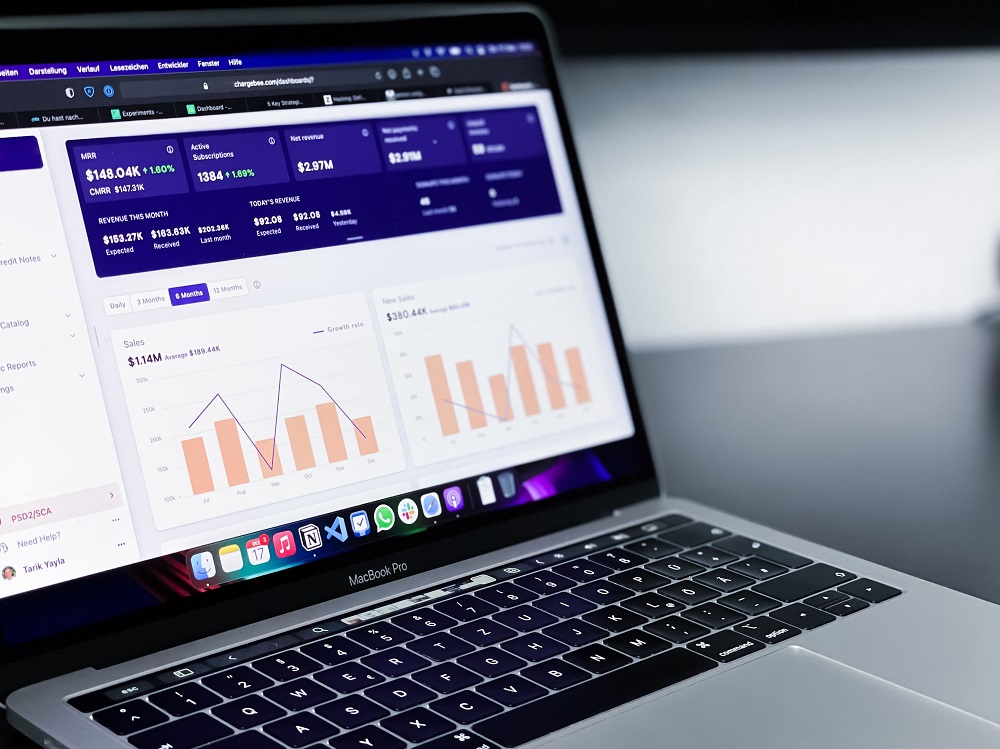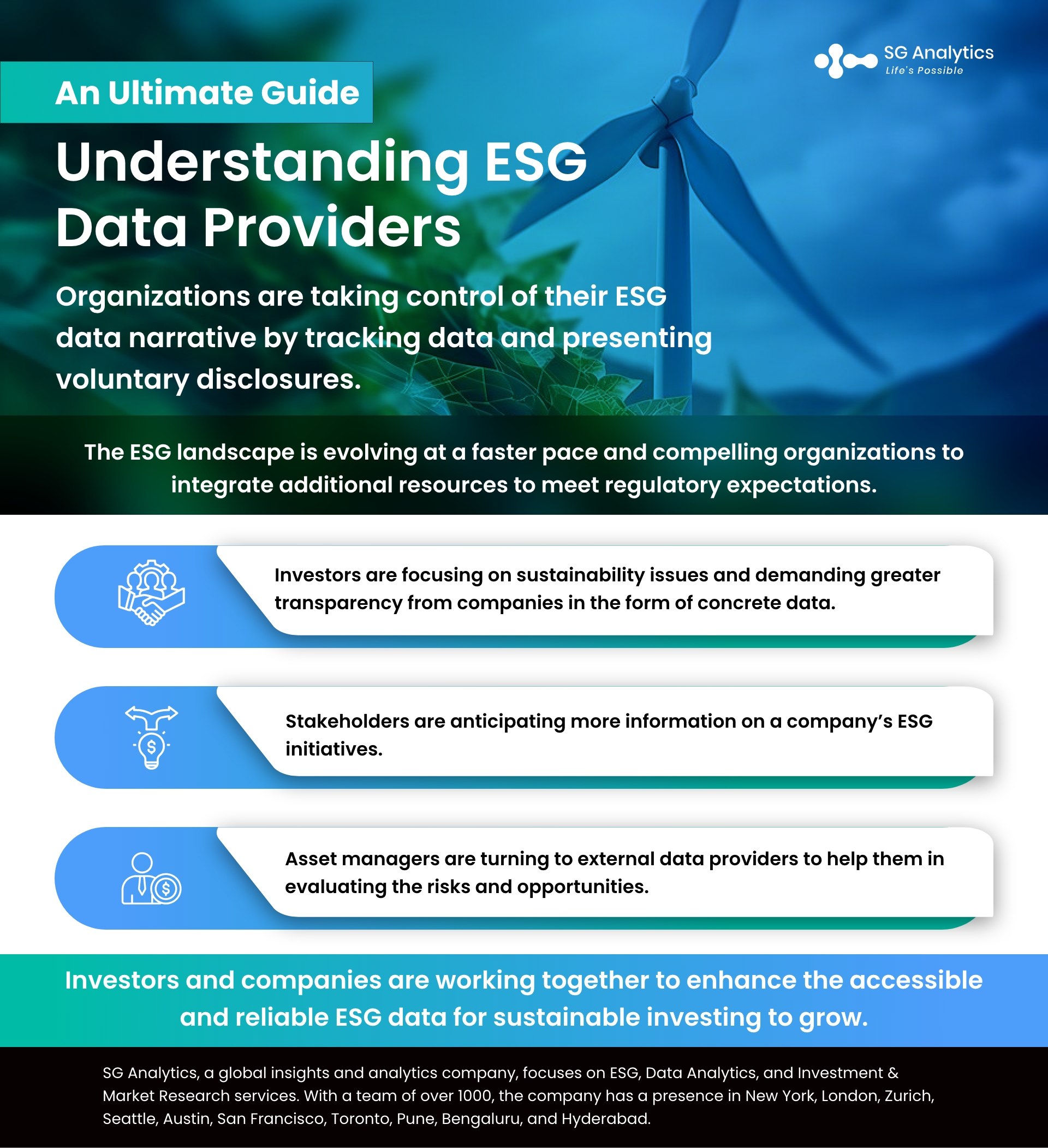ESG (Environmental, Social, Governance) investing has been growing significantly, and there are no signs of it slowing down. Today investors are majorly focusing on sustainability issues as well as demanding greater transparency from companies in the form of concrete data. This accumulated ESG data is being used to identify long-term investment opportunities with lower financial risk.
Organizations require accurate ESG data that can be used for ESG ratings, metrics, and reporting. However, access to reliable and real-time data is the only way for investors to grow alpha. As a result, a plethora of ESG data providers is on the rise, presenting organizations with a variety of solutions aimed at assisting and expanding their ESG programs.
ESG data providers today play a vital role in the investment process, as they assist with gathering and assessing real-time data about an organization’s ESG practices and present equity screens, portfolio analysis, competitive benchmarking, and risk analysis.
Read more: Investing in Energy Stocks: Hottest Green Energy Stocks to Invest in 2023

The Significance of ESG Data
ESG organizations are outperforming their peers. As per the Sustainalytics Global ESG Leaders Index, enterprises with strong environmental, social, and governance practices are likely to perform better financially than average companies.
While ESG data is vital, many are heavily focused on environmental sustainability and reporting as climate change is becoming a global risk, affecting the planet and disrupting economies. The data can generate useful insights to support environmental sustainability and help organizations enhance their business operations.
Tracking the supply value chain and keeping organizations accountable for their sustainability goals requires the use of big data analysis. With new tech innovations, companies are shifting to data providers to track and integrate their qualitative ESG data into operations.
Navigating the ESG Data Landscape
The ESG landscape is evolving at a faster pace and compelling organizations to integrate additional resources to meet investor and regulatory expectations. But with the growing expectation on firms to meet environmental, social, and governance (ESG) standards, the expectations around ESG data are also increasing.
Investors, regulators, and internal stakeholders are anticipating more information on a company’s ESG initiatives. Asset managers are turning to external data providers to help them in evaluating the risks and opportunities. For many asset managers, this data plays a vital part in attracting and maintaining socially conscious investors.

While there are several data providers with different value propositions, there are several forms of ESG data providers in the market that focus on different value propositions. ESG data providers offer an assessment of the risks and impacts of an organization's activities related to environmental, social, and governance.
With ESG gaining the limelight, company-level ESG data is improving. However, it is still fragmented for smaller companies and emerging markets. It is, therefore, important for organizations to choose the right vendor who is capable of distilling disparate data and curating easy-to-understand scoring or ratings. And the key here is to understand that not all companies will require or benefit from a data provider.
Read more: The Role of Artificial Intelligence in Achieving Sustainability and Profitability
-
The Growing Anticipation Around ESG Data
Today investors, regulators, and internal stakeholders expect more insights concerning a company’s environmental, social, and governance (ESG) initiatives. Asset managers are turning to external data providers to assess the sustainability risks. For asset managers, this data is vital to attract as well as maintain socially conscious investors. Organizations need to incorporate ESG frameworks and operate in jurisdictions that require reporting data related to carbon emissions.
-
Identifying the Key Differences in ESG Data Vendors
There are also many disparities between ESG data vendors. ESG data is primarily gathered via publicly available information, and the sources often include sustainability reports, company filings, publicly available data, and news articles. While some ESG data providers search the web for data, others engage directly with companies to collect the required information. Consistency plays an equally vital role in accurate comparison.

-
Exploring Different Data Providers with Different Value Propositions
Different ESG data providers in the market focus on different value propositions. While some data providers facilitate raw ESG data, some offer issuer-level ESG ratings, carbon footprint calculation, as well as private market coverage. An ESG data provider is a third-party vendor that presets organizations with an assessment of the impacts of a company’s activities on society and the environment. Some of the key value propositions that vary significantly from one provider to another include reporting methodologies, data outputs, and benchmarking.
One such independent ESG ratings and data partner, Inrate, based in Switzerland, leverages proprietary knowledge and empowers sustainable investors to transcend basic ESG risk assessments and unearth tangible impacts on the environment and society. With a strong value system and over 30 years of expertise in shaping the future responsibly and sustainably, Inrate's science-based methodology goes beyond traditional ESG ratings, providing comprehensive insights into a company's sustainability performance. With a focus on a company’s products, services, and controversial practices, they help uncover hidden ESG insights, make impactful investment decisions, and guide global financial markets to drive meaningful change.
-
Consistency for Accurate Comparison
Before an organization begins its process of choosing the right ESG data provider, organizational leaders involved in ESG decisions should outline the type of data they are looking to organize and identify the different use cases for ESG data reporting. Investors should evaluate the range of various data providers against their investable universe to ensure the key data elements they are looking for are met. After the organization has evaluated several aspects of the ESG data providers, the selection can be made based on factors like cost, contractual terms, and operational assistance.
Read more: The Future of Corporate Sustainability: 2023 Predictions
ESG Data Sources
ESG data can be accumulated from different sources in many forms. It can be categorized into - inside-out and outside-in. Inside-out data refers to ESG data that is reported by corporations. It is used by analysts to make judgments and identify ESG ratings and scores. Inside-out can lag by 6-12 months due to the additional research and dependence on company reporting on ESG-related disclosure. On the contrary, outside-in data is updated more frequently, in real-time.

Inside-out ESG data include:
-
Data gathered from environmental management systems (EMS) of organizations and environmental performance;
-
Data selected from governance or financial performance;
-
Information concerning labor relations, such as the quality of working conditions and work practices;
-
Data related to corporate leadership.
Outside-in ESG data include:
-
Data from external sources like smart meters, sensors;
-
Data from sources that are not physically sourced, including weather forecasts and traffic reports;
-
Data from review websites;
-
Data collected from social media such as LinkedIn, Twitter, and Facebook;
-
Processed data from News, Media, and Press Releases

Role of ESG Data in Market Analysis
ESG data is being used more effectively by investors, along with asset managers and institutional investors, to build sustainable portfolios and improve corporate governance practices. ESG data is also being used by organizations to report on their social and environmental performance. The role of ESG data is growing as it enables investors and organizations alike to conduct market analysis, support asset allocation and risk management, and offer insights for long-term sustainability.
Key themes in ESG analysis that have an increasing impact on how organizations are valued:
-
ESG data is mainstream and set to become even more important in the future.
-
ESG data is becoming easily available to investors.
-
Investors are utilizing ESG data to analyze the corporate governance and performance of an organization.
-
ESG incentives are being used to align the interests of asset owners with asset managers.
-
Asset owners are utilizing ESG data to engage with companies.
Read more: Anatomy of Consumer Data: How is it Driving Changes in Decisions for Businesses?

Taking Control of the ESG Data
Organizations are taking control of their ESG data narrative by tracking data and presenting voluntary disclosures. They are working on setting up and integrating a reasonable and standardized ESG metric to achieve comparability. By devising a high-quality process, organizations can onboard data providers that can assist in tracking accurate data and delivering it in a clear and timely manner. Investors, companies, and stakeholders are all working together to enhance the accessible and reliable ESG data for sustainable investing to grow.
By anchoring corporate sustainability disclosures with sound governance and performance systems, organizations can establish a transparent and clear communication channel that will help ensure the exchange of quality data.
With a presence in New York, San Francisco, Austin, Seattle, Toronto, London, Zurich, Pune, Bengaluru, and Hyderabad, SG Analytics, a pioneer in Research and Analytics, offers tailor-made services to enterprises worldwide.
A leader in ESG Services, SG Analytics offers bespoke sustainability consulting services and research support for informed decision-making. Contact us today if you are in search of an efficient ESG (Environmental, Social, and Governance) integration and management solution provider to boost your sustainable performance.









